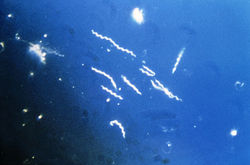Difference between revisions of "Borrelia burgdorferi"
Jump to navigation
Jump to search
| (15 intermediate revisions by 3 users not shown) | |||
| Line 1: | Line 1: | ||
| − | {{ | + | {{review}} |
| − | + | ||
| − | |||
| − | |||
| − | |||
| − | |||
| − | |||
| − | |||
| − | |||
| − | |||
| − | |||
[[File:Borrelia b.jpg|right|thumb|250px|<small><center> ''Borrelia burgdorferi''. (CDC 1993, Wikimedia commons)</center></small>]] | [[File:Borrelia b.jpg|right|thumb|250px|<small><center> ''Borrelia burgdorferi''. (CDC 1993, Wikimedia commons)</center></small>]] | ||
| − | |||
| − | |||
| − | |||
| − | + | ''Borrelia burgdorferi'' is a species of ''Borrelia'' bacteria. ''Borrelia'' species are longer, wider, helical [[Spirochaetes species - Overview|spirochaetes]]. | |
| − | Ticks are the vector for [[Lyme | + | ''Borrelia burgdorferi'' is the cause of '''[[Lyme disease]]'''. The ''Borreliae'' bacteria multiply in the blood stream of susceptible hosts and disseminate throughout the body. They can localise in joints, brain, nerves, eyes and heart. |
| + | |||
| + | The bacteria are reported in humans, dogs, horses, cattle, sheep. | ||
| + | |||
| + | Ticks are the vector for [[Lyme disease]], in particular, ''[[Ixodes spp.]]''. | ||
| − | |||
| − | |||
| − | |||
| − | |||
| − | + | [[Category:Borrelia species]][[Category:Dog]][[Category:Horse]][[Category:Cattle]][[Category:Sheep]] | |
| − | [[Category: | + | [[Category:Expert_Review]] |
| − | [[Category: | + | [[Category:To_Do_-_AimeeHicks]] |
Revision as of 14:02, 20 July 2010
| This article has been peer reviewed but is awaiting expert review. If you would like to help with this, please see more information about expert reviewing. |
Borrelia burgdorferi is a species of Borrelia bacteria. Borrelia species are longer, wider, helical spirochaetes.
Borrelia burgdorferi is the cause of Lyme disease. The Borreliae bacteria multiply in the blood stream of susceptible hosts and disseminate throughout the body. They can localise in joints, brain, nerves, eyes and heart.
The bacteria are reported in humans, dogs, horses, cattle, sheep.
Ticks are the vector for Lyme disease, in particular, Ixodes spp..
